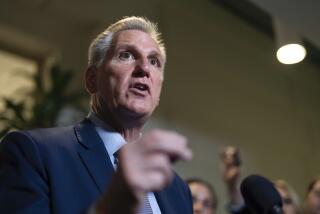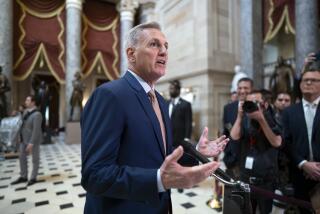House Gets New Campaign Reform Bill
- Share via
WASHINGTON — Despite discouragement from Republican and Democratic leaders, a bipartisan coalition of House freshmen introduced their own campaign reform legislation on Thursday, expressing disgust at a system they said is awash in money.
The proposal, more than six months in the making, becomes one of nearly 70 pending bills that would change the nation’s election financing laws. As of now, none seems headed for passage. But reform supporters--such as the freshmen coalition--remain hopeful a critical mass can be reached that will force congressional action.
The new measure, offered as the Senate Governmental Affairs Committee continues its hearings about assorted abuses and manipulations of campaign money, would ban so-called soft money--unregulated contributions used by political parties for partisan purposes.
“When it passes, $100,000, $500,000 and $1-million contributions to the national parties will be history,” said Rep. Thomas H. Allen (D-Maine), co-chairman of the freshman campaign reform task force.
“We believe in legislating, not just investigating,” he added, referring to the Senate hearings, as well as a probe scheduled for later in the year by a House committee.
But Allen and Rep. Asa Hutchinson (R-Ark.), the task force’s other co-chairman, conceded the lack of momentum in Congress for enacting any kind of campaign finance reform.
“All we ask,” Allen said, “is a vote on the House floor.” Hutchinson said the group is committed toward that end “even if that means ruffling a few feathers.”
In fact, the House leaders of both parties, joined occasionally by interest groups that also oppose reform, leaned hard on the freshmen not to put forward a reform proposal. Faced with that pressure, some freshmen backed away from the effort, according to members of the bipartisan task force.
So far, seven Republican and 23 Democratic freshmen have signed on as co-sponsors, and the bill’s backers say more are likely to come on board.
“We haven’t begun to reach out yet,” Allen said.
The bill would prohibit the national parties from accepting soft money or raising it on behalf of a state party. And state parties would be banned from transferring soft money from state to state.
The measure also would allow current limits on contributions to federal candidates to rise with the rate of inflation. Such limits--such as a $2,000 cap on individual donations to presidential candidates per election--have not been raised since 1974.
In addition, fuller and more prompt contribution disclosures would be required of political campaigns.
More to Read
Get the L.A. Times Politics newsletter
Deeply reported insights into legislation, politics and policy from Sacramento, Washington and beyond. In your inbox twice per week.
You may occasionally receive promotional content from the Los Angeles Times.










